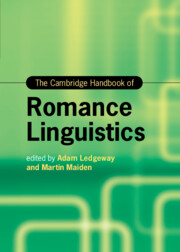Book contents
- The Cambridge Handbook of Romance Linguistics
- Cambridge Handbooks in Language and Linguistics
- The Cambridge Handbook of Romance Linguistics
- Copyright page
- Dedication
- Contents
- Figures
- Tables
- Contributors
- Abbreviations
- 1 Data, Theory, and Explanation: The View from Romance
- Part One What Is a Language?
- Part Two Phonetics and Phonology
- Part Three Morphology
- Part Four Syntax
- 16 Argument Structure and Argument Realization
- 17 Agreement
- 18 Alignment
- 19 Complex Predicates
- 20 Dependency, Licensing, and the Nature of Grammatical Relations
- 21 Parametric Variation
- Part Five Semantics and Pragmatics
- Part Six Language, Society, and the Individual
- Index
- References
17 - Agreement
from Part Four - Syntax
Published online by Cambridge University Press: 23 June 2022
- The Cambridge Handbook of Romance Linguistics
- Cambridge Handbooks in Language and Linguistics
- The Cambridge Handbook of Romance Linguistics
- Copyright page
- Dedication
- Contents
- Figures
- Tables
- Contributors
- Abbreviations
- 1 Data, Theory, and Explanation: The View from Romance
- Part One What Is a Language?
- Part Two Phonetics and Phonology
- Part Three Morphology
- Part Four Syntax
- 16 Argument Structure and Argument Realization
- 17 Agreement
- 18 Alignment
- 19 Complex Predicates
- 20 Dependency, Licensing, and the Nature of Grammatical Relations
- 21 Parametric Variation
- Part Five Semantics and Pragmatics
- Part Six Language, Society, and the Individual
- Index
- References
Summary
This chapter offers an overview of the development of the theory of agreement highlighting the major contributions that have been proposed on the basis of the Romance languages. The first part of the chapter follows the analysis of verb–subject agreement from early generative grammar to contemporary syntactic theory. After a short overview of syntactic agreement, the chapter moves on to morphological agreement, discussing among other things the relation between rich agreement and null subjecthood as well as agreement and subject clitics in Romance. The chapter offers a number of examples from standard and non-standard Romance languages.
Keywords
- Type
- Chapter
- Information
- The Cambridge Handbook of Romance Linguistics , pp. 519 - 543Publisher: Cambridge University PressPrint publication year: 2022
References
Selected References
- 1
- Cited by

